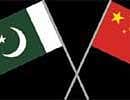
"We as a first step are looking for more information from China as to what it is potentially proposing," State Department spokesman P J Crowley told reporters.
He was responding to a question on last week's meeting of the Nuclear Suppliers Group (NSG) in New Zealand, wherein China informed the group about its decision to supply two additional nuclear power plants to Pakistan.
"We did raise the issue during last week's Nuclear Suppliers Group. We continue to seek information from China regarding its future plans," Crowley said.
There was no unanimous consensus at the meeting of the NSG, which operates by consensus.
"We have a view that this initiative as it goes forward would need the agreement of the Nuclear Suppliers Group," Crowley asserted giving a sense of the US position on this issue.
Meanwhile, the Arms Control Association - a Washington-based non-proliferation advocacy group - said the 46-member NSG at its biannual meeting in New Zealand failed to agree on tougher guidelines governing the transfer of enrichment and reprocessing technology.
China sidestepped questions raised by NSG members about Beijing's plan to sell Pakistan two additional reactors in violation of NSG guidelines.
Daryl G Kimball, of the Arms Control Association, argue that if the NSG is to remain effective and credible, member states must respect uphold their own rules, avoid actions that feed the nuclear arms race, and strengthen their guidelines to prevent weapons-related nuclear technology from proliferating in the years ahead.
In an article in The Wall Street Journal, Director General of the Kerala International Center T P Sreenivasan wrote that placing additional nuclear capability in the hands of Pakistan, even peaceful nuclear reactors, will fly in the face of NSG guidelines.
"China's silence is no indication of its willingness to change its behaviour. In fact, if past experience is any guide, neither China nor Pakistan can be expected to further the cause of nonproliferation. If the NSG doesn't speak out now, its very credibility will be undermined," he wrote.
"To draw a parallel between a specific exemption given to India and the unilateral action by China is to ignore the three years of agonizing negotiations based on India's record of responsible behavior and its pressing energy needs.
"India separated its military reactors from civilian stations, agreed to International Atomic Energy Agency-led safeguard inspections of the latter, applied for a waiver of NSG guidelines and gave various assurances to the international community," he said.
"Pakistan, which sold nuclear-weapons technology to clients in North Korea, Libya and Iran, can hardly be equated with India. Islamabad is compiling a nuclear arsenal far in excess of the minimum deterrent that the country is supposed to possess," Sreenivasan said.
Pakistan is also blocking negotiations on the Fissile Material Cut-off Treaty in Geneva precisely to gain time to accumulate more fissionable material.
This is hardly an opportune time to signal acceptance of the peaceful nature of Pakistan's nuclear program, he noted.
China's own credibility as a disciplined member of the NSG has often been called into question, he said, adding even while China has been using Pakistan as a conduit for supply of nuclear technology, it has directly assisted Iran in developing missile technology and supplied missiles to Saudi Arabia.
"Its nuclear activities reveal a clear strategy to use their nuclear assets to secure economic and political concessions in South Asia and the Middle East," the article said.